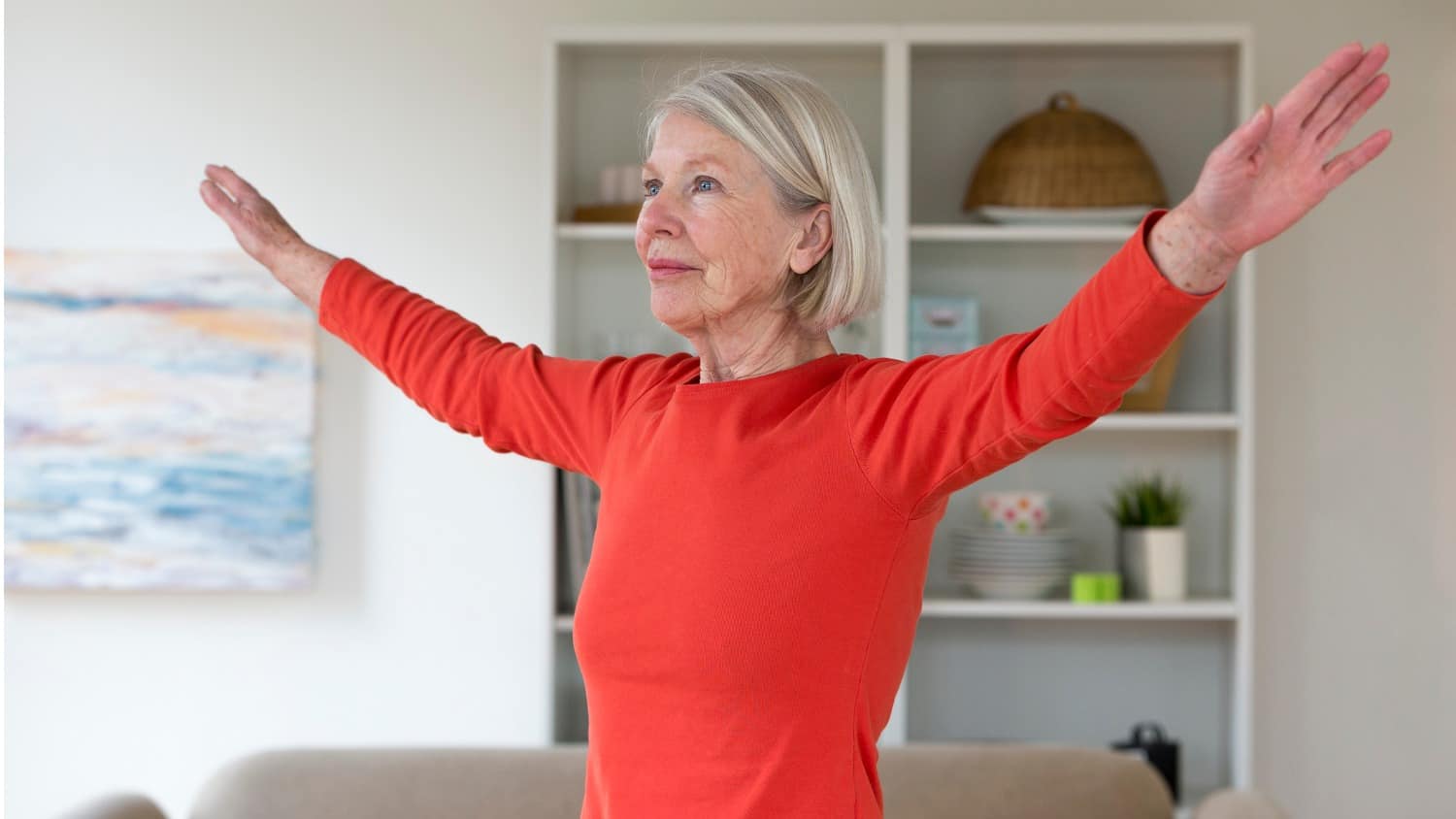
How to Manage Pandemic Anxiety to Avoid Weight Gain and Stress
Have you been experiencing surges of anxiety pretty much daily since the pandemic started? Or maybe you’re feeling a low level buzz of stress. Your brain may be swirling with all kinds of “what ifs” that you can’t answer. For many people, uncertainty fuels anxiety.
Anxiety may not feel good, but its purpose is to protect us. Right now, we’re literally living a Sci-Fi movie, so we naturally respond with fight, flight, or freeze.
Financial worries, fear of the unknown, not knowing when we will see our kids and grandchildren next, isolation, and collective grief are just a few things that are on the minds of women over 60 these days. There is so much up in the air.
The Woe of Constant Stress
The problem is that when we’re in a steady stream of stress, it takes a big toll on us, both physically and mentally. Feeling some stress during the pandemic is inevitable, but because chronic stress compromises your body’s immune system, which is the last thing you want right now, it’s important to take steps to mitigate it.
Not only that, but as a healthy weight coach, a lot of women tell me that they indulge in comfort eating to manage these anxious feelings. This causes weight gain, and the stress hormones your body releases actually make it even easier to gain weight than usual. Like being over 60 didn’t make that easy enough!
Here’s what I mean. When you’re stressed, your body releases the stress hormone cortisol as a means of responding to stress and helping your body adapt. Unfortunately, too much cortisol causes weight gain, digestive problems, heart problems, depression, difficulty concentrating, and lowered immunity.
Right now, you want your immune system to be in top form for obvious reasons. That’s why it’s so important to manage your anxiety. You’ll be less likely to overeat and gain weight, but you’ll also feel more calm and centered as you navigate through your days.
Before providing you with some approaches to reduce your anxiety, first ask yourself whether your level of anxiety is appropriate for the situation. What is your anxiety trying to tell you? Is it giving you a balanced perspective or just the gloom and doom forecast? In other words, is it helping you or merely hindering you by stressing you out?
If you’re in a constant state of panic because you’re afraid you’ll get Covid, perhaps your anxiety is helping you to remember to wash your hands and take precautions. If, however, you’re in the habit of doing that already, freaking out about Covid is serving no purpose other than messing with your immune system.
So what can you do? I’m not a doctor, so I can’t give you medical advice, but I can tell you what works for me and give you some ideas to try.
Accept the Reality of What You Can’t Control
Not only can’t you control the pandemic, you control way less than you realize of what goes on in your life on a day-to-day basis. It’s a fact of life.
Your brain is comprised of an emotional part and a thinking part, both of which play an important role. Anxiety is a product of the emotional part. To manage your anxiety, you need to access the rational, thinking part of your mind. That means you have to accept the reality of what you can’t control and examine your thoughts rather than simply believing them.
Michael Singer, author of one of my favorite books, The Untethered Soul, said, “The truth is that most of life will unfold in accordance with forces far outside your control, regardless of what your mind says about it.”
Take a minute right now to realize that we have very little that is within our control. Don’t let that be unsettling. Accept it as the reality that it is. We can’t control the weather, or what other people do or think. And so much more.
Byron Katie, who found true inner peace the moment she stopped fighting with reality, says: “When you argue with reality, you lose, but only 100% of the time.”
Fretting about the pandemic, trying to figure out how long it will last, being overtaken by fear of contracting Covid, and the like is making your life more stressful, which has no upside.
That “I have no control” feeling can stress you out until you realize that yeah, that’s pretty much always the reality of life. That doesn’t mean you can’t do some reasonable planning, but even that is considerably harder when you’re in full panic mode.
While I’m quoting some of the wisest people I can think of, Pema Chodron, in her book Comfortable with Uncertainty, acknowledges that not knowing is part of the adventure, but it’s also what makes us afraid. She points out that we should never underestimate our low tolerance for discomfort. But it is important to be willing to feel some discomfort because it’s part of life.
Practice Mindfulness of Your Thoughts
When your brain goes off into “what if” land, you’re not in the present moment. You’re wasting your imagination worrying about things that haven’t happened and may not happen. One of my favorite quotes by Mark Twain is, “Some of the worst things in my life never happened.”
That’s true about everything we worry about. When you notice that you’re worrying about something over which you have no control, stop and take a deep breath.
Drop into your body and feel your body breathing. Get centered. Look around you and notice a thing of beauty, like a flower or a bird. Hug your cat or dog. The present moment is all that we’ve got. Enjoy it as best as you can.
Meditate at Least Daily
If you haven’t started meditating yet, what are you waiting for? Seriously, meditation is my life raft these days. When I feel really stressed out or anxious, I go outside, weather permitting, and meditate in the sunshine on my deck for 20 minutes.
If I’m anxious, my heart stops pounding, my breathing eases, and I relax into the moment. It feels so good and doesn’t cost a cent.
Download the free Insight Timer or another meditation app to help you get started. Meditate every day. If you’re new to it, start small, with just five minutes a day. You can do it for 5 minutes! Notice how much better you feel.
Breath Work
There are many types of breath work, or pranayama, that can bring you back into your body when your brain is telling you things that stress you out. Research has shown that deep, diaphragmatic breathing can reduce cortisol levels.
Breath work is something you can do any time. Simply find a comfortable place to sit or lie down. Breathe in deeply through your nose, relaxing your lower belly and feeling it expand with air. Then breathe out through your mouth or your nose.
You should feel relaxed after a few breaths. I like to imagine that I am breathing in peace and calm, and breathing out stress.
Try the “square breath,” which involves breathing in for four counts, holding for four counts, breathing out for four counts and holding for four counts. Do it at least four times.
Limit News Exposure
So many people are overdosing on the news these days. I get it, but it is super stressful. Yes, we need to stay informed, but I try to limit my Covid reading to 10 minutes a day, and if I don’t want to go to bed all stressed out, I don’t read the news after 8 pm.
Exercise Daily
If you don’t already have one, establish a regular exercise routine. Try to get outside every day for a walk or a bicycle ride. Getting some sunshine and clearing your head is a wonderful thing that will help your mood. Set a schedule for yourself, and just do it!
Also avail yourself of all the free or donation-based qigong or yoga classes that have gone live on Facebook, Instagram, or YouTube now that the yoga studios and gyms are closed. Discover something new and fun. Get moving!
So take care of yourself and the people you love. Stay connected. Call a friend on FaceTime. And don’t let stress take over.
Has the pandemic affected your eating habits? Do you feel stressed all the time? What do you do to lower your stress levels? How often do you catch yourself indulging on news that only make you feel more stressed? Let’s talk about it in the comments below.






